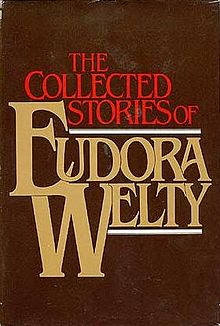I live down the hill from a Free Little Library, and before I went to Texas for two weeks to save my flooded house, I stopped by the library to find a book. Usually, the books we choose from the library are children's books for our son, but on that particular day, The Collected Stories of Eudora Welty sat there behind the small door.
That is not a pocket-book, my partner said, nodding at the book when she picked me up from the airport.
She was right. I guess people take light reading on the airplane. My light reading weighed a couple pounds, and might have counted as carry-on luggage had airport security felt like making an argument.
The copy of the book is large. Not just thick, but with large pages about two-hands tall. It was published a year near my birth year. Were I my mother, I would find this significant in a telling way. Because I'm a writer. Eudora Welty was a writer. We are women. We write stories. Continue the similarities necessary for symbolism, as you see fit.
But I'm not my mother, though I do share her tendency toward symbolism, so as I looked at the copyright page, I just imagined what my mother would say. Were Eudora born in 1913 like my grandmother, rather than in 1909, it would be easier to believe, rather than simply imagine, implications between numbers and lives.
 |
| Cover of The Collected Stories of Eudora Welty |
The copy is also water-damaged. Not so bad to interfere with the words, but clearly the book is
rippled. Perhaps left in a basement box. Perhaps a bottom shelf over so many years by a window that tended to be left open.
Inside the copy is the
New York Times obituary of Eudora Welty, cut carefully out. It ran from one page to another, and both pages are here. In the margins of only a few stories is blue-ink cursive in a woman's hand, or at least the cursive is small and careful and reminds me of the cursive from the weekly letters my grandmother wrote to my mother.
It's a copy, then, that was not only bought, but also saved. A copy read through. A copy owned by a person who took time while she read. A teacher? Maybe. A student, surely at one time, to have a habit of writing in the margins.
All of this is important to me. I'm one of the history of people that believes the book is a sacred object, one in a line of people who has inherited the memory of when books were incredibly expensive, always rare, for only the wealthy, kept from the hands of the class of people that encircle the trunk of my family tree and reach out.
I can't help but feel romantic about the physicality of a book, this place where someone's thoughts wait to enter the thoughts of another, all without speaking. So intimate, this.
Well, not every book does this to me. Not every binding. I started examining the book after I started reading the stories and realizing how wonderful they are.
What took me so long to find her? I think I read an excerpt of her talking about writing, on growing up as a reader. I might have even taught it to a class of 101 students, years ago. I've read a few of her commonly anthologized stories, "A Worn Path," for example, but the anthology stories didn't strike me like these have.
Regardless. This is an excellent book of stories. I'm five stories in, 50 pages out of over 600 pages. If I wait to suggest this book to you, several years will have passed. That's how I read now. When I find a collection that is awesome, I force it to last. For example, when I read Sherwood Anderson's Winesburg, Ohio, I waited a year before reading the very last story.
But I want to tell you about this book now. It is a strange book. Her writing reminds me of Flannery O'Connor, whose work I very much enjoy. And Harper Lee. Not just because she's Southern, or maybe also because of that. She also reminds me of Patricia Highsmith. And all the writers I like, do have a tendency to have lived in the South, and to gravitate toward depictions of the grotesque, the not-quite, the school of you-won't-believe-it-but-yes-life-is-like-this, with a twist of dark humor in the voice, always there, too. Writers who write about characters who live in poverty but whose lives are not the butt of jokes because of that. Characters whose lives didn't turn out as happy stories might. Characters who find themselves controlled by others who don't realize how they're controlling the lives of others. Female characters, in particular, caught in lives orchestrated by a history of gendered expectations--whether they realize this, fight this, or not. Usually, not, though the writer does.
Maybe I gravitate toward fiction written in the 1950s because my mother was born in 1939. Once, when I asked my mother about feminism, she said, Well, it was a surprise. I hadn't even considered it.
Anyway. You might enjoy Eudora Welty's stories, too. Today is the last day of National Short Story Month in the United States. A perfect way to celebrate is to find a copy of The Collected Stories of Eudora Welty and enjoy the pages between now and next year's short-story month. I won't be done with them yet, but we can check in, then.
- Find The Collected Stories of Eudora Welty in a public library near you by using WorldCat.org.
- Purchase The Collected Stories of Eudora Welty in your local bookstore by using IndieBound.
- Locate the nearest Free Little Library near you, and hope that you have a neighbor who left it there; or, leave your copy there when you're done with it.
- And, Amazon, has a copy, too.
Or begin by reading my favorite story so far, "A Piece of News." Here is one of my favorite passages from it, in which the main character Ruby imagines her death after reading an article in the newspaper about her own death, or the death of a woman with the same name, or (so many overlapping possibilities):
[…] At once she was imagining herself dying. She would have a nightgown to lie in, and a bullet in her heart. Anyone could tell, to see her lying there with that deep expression about her mouth, how strange and terrible that would be. Underneath a brand-new nightgown her heart would be hurting with every beat, many times more than her toughened skin where Clyde slapped at her. Ruby began to cry softly, the way she would be crying from the extremity of pain; tears would run down in a little stream over the quilt. Clyde would be standing there above her, as he once looked, with his wild black hair hanging to his shoulders. He used to be very handsome and strong!
He would say, “Ruby, I done this to you.”
She would say—only a whisper—“That is the truth, Clyde—you done this to me.”
Then she would die; her life would stop right there.
She lay silently for a moment, composing her face into a look that would be beautiful, desirable, and dead.
(Excerpt from the story "A Piece of News" by Eudora Welty)





